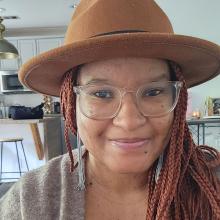Member Spotlight: Amber B. Sansbury, M.Ed.
What interested you in becoming a developmental scientist?
After completing my undergraduate degree in Middle East Studies at Georgia State University in 2009, I thrived in a policy career throughout the East Coast and DC area before starting the Master's program for Early Childhood Education Curriculum & Instruction at Mason in 2016. My interdisciplinary ECE policy interests build on developmental science research examining African American and immigrant families' experiences across early care and education multi-delivery systems (e.g., Head Start, early intervention, district, home-based licensed, and community programs). I am deeply committed to shared policymaking, culturally-grounded family engagement, and action to challenge inequitable structures in the early years.
Do you have a mentor or mentors who have been instrumental in your career and, if so, by whom and how?
I have been supported and trained well throughout my doctoral journey! Internal to George Mason, Dr. Colleen Vesely mentored me in incorporating community-based participatory research (CBPR) approaches to family engagement across ECE multi-delivery systems. Our scholarship has focused on African American, Afghani refugee, African immigrant, and Spanish-speaking Central American immigrant families facing economic disadvantage in particular. I have had ample opportunities to manage projects and program evaluation as well. I have served as co-project manager for the Gates Foundation Educare Black- majority Schools project qualitative Phase II with Dr. Iheoma Iruka beginning in Fall 2020. I similarly have communicated and interpreted the importance of research evidence through presentations at state and national conferences, parent and community meetings with non-academic audiences, legislative comment periods, research and policy briefs, and social media through the Researchers Investigating Sociocultural Equity and Race (RISER) Network. These opportunities have been supported in collaborative work in survey development, case study, and program evaluation across states as a Research Fellow working with Dr. Stephanie Curenton-Jolly for the Center on the Ecology of Early Development (CEED) and Drs. Latrice Rollins and Rodney Washington as an Emerging Scholar for the National African American Child and Family Research Center (NAACFRC). This range of experiences have strengthened my commitment to equity and voice as an advocate for Black children, ECE teachers, and families in leading journals including the Early Childhood Research Quarterly, Handbook on the Science of Early Literacy, Policy Insights from the Behavioral and Brain Sciences, and the Annual Review for Developmental Psychology.
What words of wisdom might you pass on to someone on their very first day after deciding to get a Ph.D. in developmental science or related?
Your future is limitless! Looking back, I could not have foreseen the doors and pathways that have opened in the context of reciprocal research partnerships. I now understand that developmental science is relevant- and can be collectively translated to improve evidence use with rigor. I now prioritize developing, communicating, and interpreting evidence use across audiences through academic publications, oral presentations at state and national conferences, parent and community meetings, legislative comment periods, and technical assistance with human service agencies.
What’s your favorite aspect of SRCD membership?
The SRCD Black Caucus! We had a time sharing memories, honoring our founders, and celebrating the Black Caucus’s 50th anniversary at last year’s Biennial.
Who inspires you?
I am inspired by Black young children, families, and ECE providers who work in multiple settings. Their stories- and keeping the range of challenges, lived experiences, context, and strengths at the forefront- keeps me motivated.
What is a typical day like for you?
I defend my dissertation in May! These days, my time is largely spent in qualitative interview analysis and preparing the final chapters of my dissertation. I also have been actively applying for jobs over the last year. I ultimately aim to work in a fast-paced Social Science Analyst role for a human services government agency, bringing the relevance of evidence use to coordinated state and federal policymaking.
What is something you learned in the last month?
Recently, I had the pleasure of celebrating the Lunar New Year with a few close friends in the DC area. This was a sweet time of learning more about their Chinese culture, evolving family history across continents, and norms for celebrating their ethnic values. I learned that Lunar New Year has been recognized through distinct traditions throughout Asia and abroad. This particular time with my friends deepened our relationship and my awareness of the beautifully complex ways that they make meaning of family.
What does the Black Caucus mean to you?
The Black Caucus is my home and community as a developmental scientist who conducts policy-oriented scholarship. Our collective work continues to promote justice and well-being for Black children, families, and communities across the Diaspora. I am honored to be an elected leader and to contribute to our ongoing legacy.
